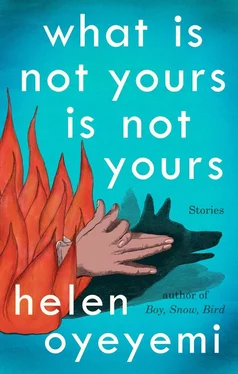—
WHEN MY NAME was called I entered the audition room and my glove puppet made an irresolute attempt to eat a sugar cube from a bowlful that had been left on a table, then gave in to despair and decided to sleep. After a minute there was a crackling sound in the corner of the room and I heard your voice through the speaker, Myrna, trying to give me a chance. “Miss Chaudhry, don’t you have anything prepared? You’ve only got ten more minutes and as you may have seen in the waiting room, we’re observing quite a few applicants today.”
This reminder had no effect on me; I continued as I was until someone knocked on the audition room door and then came in, glancing first at the clock and then through the mirrored wall to the spot where I presumed you were sitting. It was a boy who came in — he had a hand behind his back, and I think I would’ve found that threatening if it weren’t for his deep-set, elephantine eyes, the patience in them.
“I’m Gustav,” he said. “Give me your puppet and you shall have a different one.”
“What will you do with mine?”
“It’s up to him. He can sleep all he wants and have as much sugar as he likes, make new friends, maybe change the position of the parting in his hair if he’s feeling daring. Quickly, take her.”
I handed over my glove puppet and received a brass marionette in exchange. “I got this one out of the store cupboard. She hasn’t been out in a while… a lot of people find they can’t work with her; she’s haunted,” Gustav said over his shoulder, as he left the room. Smashing.
—
ORCHESTRATING this new puppet’s movements seemed hopeless; I was holding the wooden bar that controlled all her strings correctly, and none of the strings were tangled, but that had been Gustav’s quick, deft work, not mine. Though we both stood still I felt the marionette advance upon me, and without moving I shrank away.
“Five minutes,” you said through the speaker, not hiding the note of incredulity in your voice. I spoke to the puppet in the looking-glass English that my ghost friend speaks. I asked her if she was haunted or something worse. She answered eagerly, as you do in a foreign country when you need assistance and come upon someone who speaks your language: “Worse thingsome,” was her answer. “Worse thingsome.” And if I help you now, you must help me later.
You won’t ask me to harm anyone? I asked.
Never.
Then I accept.
Good. Simply translate what I say. I will speak; don’t worry about the controls, I will match your posture, it’ll look better.
She spoke the way that my ghost friend spoke — it cannot be that all ghosts speak the same way, I knew that even then — and I translated. It didn’t take long:
I am not a haunted puppet, we said , I am living. My name is Gepetta and a long time ago I was an apprentice to two puppeteers whose names are honored in this place. I took care of the puppets in the workshop — I was a kind of nurse to them, tending to their damage, and making sure that they lasted. Their masters grew old and died, and I stayed with the puppets. They were not living, but one step away from living, always one step away. They know when human life is near them, and they need human life to be near them; it keeps them from going… wrong.
I began to train others in the care of puppets. In my time it seemed such knowledge was dying out… I trained a few boys and girls who wanted to learn, but a plague came. Not a plague that revealed itself in the skin, this one crept through the air. My apprentices died, and I would have too, but my puppet charges forbade it.
Each puppet sacrificed something — a leg, an arm, torso, head, and so on… you will replace these things when you are ready, they said.
They assembled a body, but didn’t join up the parts.
Look at your new body. You will go in, they said.
I said I would not, but it happened hour by hour; I would drowse a little and when I woke another part of me had been replaced. It began with my left hand and ended with my right foot. Think of it: looking down at your human foot out of a pair of brass eyes. And then I grew smaller, and all of a piece, as I am today. My name is Gepetta; long have I wanted to say this, but nobody would help me to say it…
—
SO THAT WAS how I met my friend Gepetta. And as you know, Myrna Semyonova, three days later I was called back to your school, our school, and I found Tyche Shaw waiting for me. And you were there, and so was Gustav Grimaldi. Then I knew I’d been chosen, and I went to you. You smiled and said, “Well done,” but it was Gustav who took my hand and said: “Welcome, Radha. We’ll do such things together!”
My ghost friend was right: I disobeyed you and so you didn’t choose me. But what were your reasons for choosing Tyche? I saw even then that you would try your best to break what she carries.
Why are you telling me all this again, you say impatiently, but a person doesn’t easily recover from the sadness of finding that it’s not always affinity that draws us together (not always, not only), that you can be called to undo the deeds of another. You make a lot of work for me — my blood runs cold to think of it all — but you see I take strength from remembering that you began with intentions that were pure.
II.
(YES)
RADHA AND GUSTAV had a shaky start. She brought me along to their first meeting and the three of us walked around Berkeley Square. “Hi, Gepetta,” Gustav said to me. He always says hello to me, even though I never reply. His good manners are his own affair. Radha threw breadcrumbs to pigeons. Gustav kept his sunglasses on the entire time and talked at length about the work of several mid-twentieth-century filmmakers Radha had never heard of. I could see Radha making up her mind that if she was going to learn anything from Gustav it would be by accident, and I saw her changing her mind when he introduced her to his puppets—“You’ve brought yours,” he said to Radha, nodding in my direction, “and I’ve brought mine.” Four of them had accompanied him to this meeting; two peeping out from each of his coat pockets. They were good-natured fatalists one and all, never in a rush, preferring to put off action until matters had resolved themselves without anyone in the troupe having had to lift a finger. The leader of the pack was a disheveled sophisticate named Hamlet. It was Hamlet who became Radha’s chief extracurricular guide, her lecturer, heckler, cheerleader, and coconspirator. At those times we all forgot whose voice and hands Hamlet and company were making use of, and the next day Radha would report mastery of some minor voice control trick to Gustav as if he hadn’t been there in the room with us. Initially it seemed that this type of forgetfulness seriously displeased Gustav, but as we grew more comfortable with him I began to see that when Radha told him something odd or amusing that Hamlet or one of his other puppets had said or done, what Gustav actually expressed was restrained interest. He was observing a process we were not yet privy to.
—
I CAUGHT ON LONG before Radha did. She spoke to Gustav’s troupe in a way that she would never have spoken to him directly. As this confidence flourished, so did a sympathy between Radha and Gustav’s puppets, who devoted themselves to making her laugh and would materialize en masse outside her classroom door and walk her to the bus stop at the end of the day, crying: “Make way for boss lady!” Gustav surrounded her with her especial favorites: Hamlet with his pudding bowl haircut, Chagatai, who was both assassin and merman (he kills sailors with his sexy falsetto!), Brunhild the shipbuilder, and an astronaut named Petrushka, who answered any question put to him in exhaustive detail. Also present was a toddler-sized jumping bean known as Loco Dempsey. Their master walked behind Radha, arms raised as he worked the controls high above her head. Under Gustav’s command all the strings stayed separate; Radha marveled at that and leaned into him so as not to be the body that tangled those clean lines. He nudged a few of the controls into her hands, lowered his arms so that he was holding her — not tightly, since there’s only so much you can do with your elbows. He whistled a brisk polonaise and her gestures led his as she set Brunhild and Loco to marching. Radha looked so happy that I thought some kind of admission was forthcoming later, but instead she turned to me and said: “That can’t be the same gang Myrna told me about.”
Читать дальше












